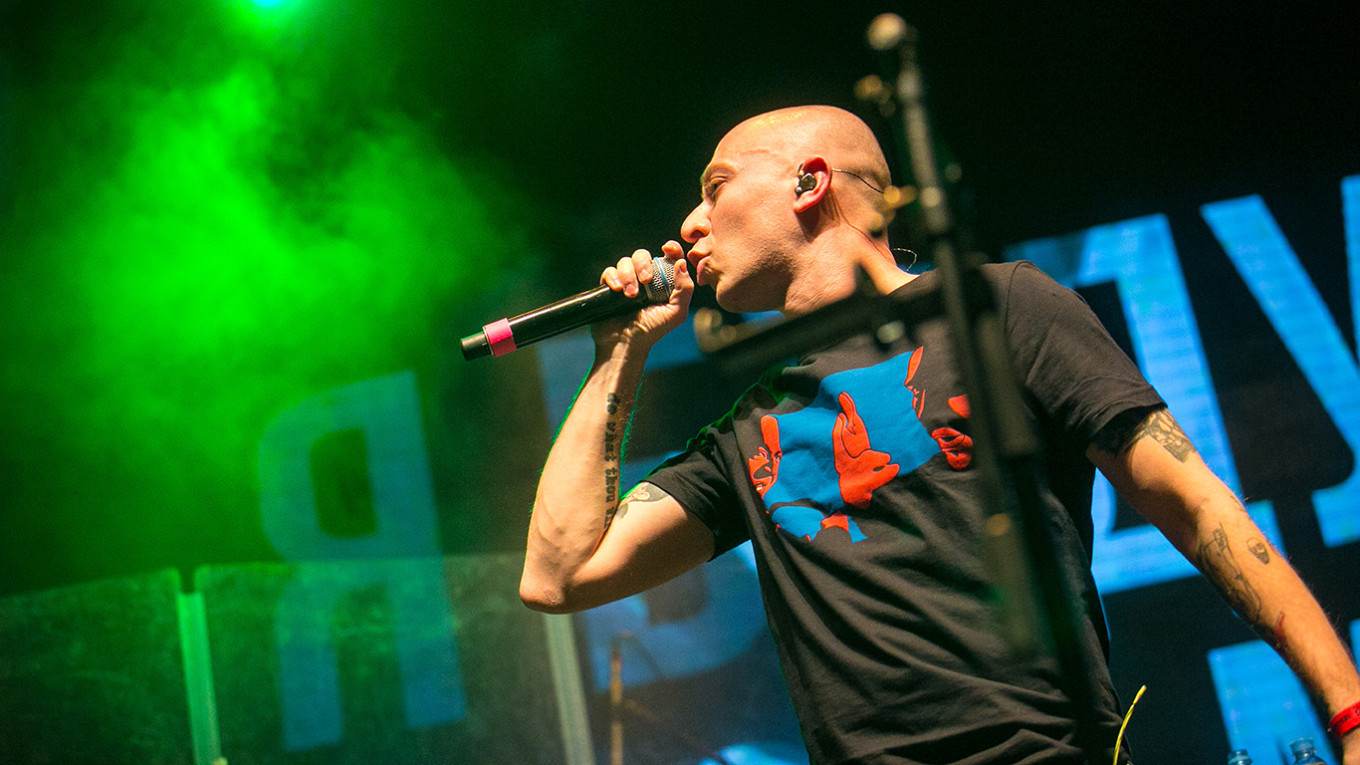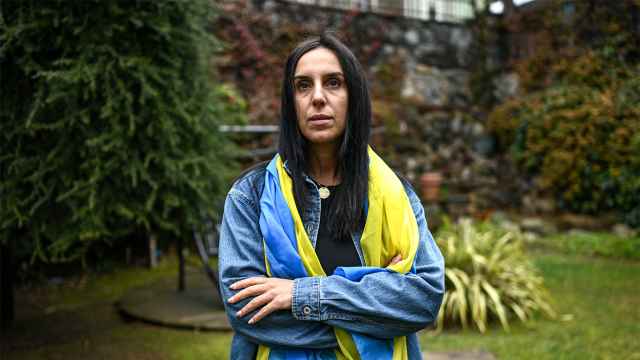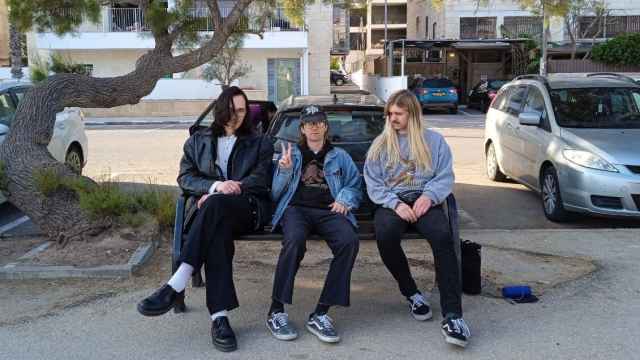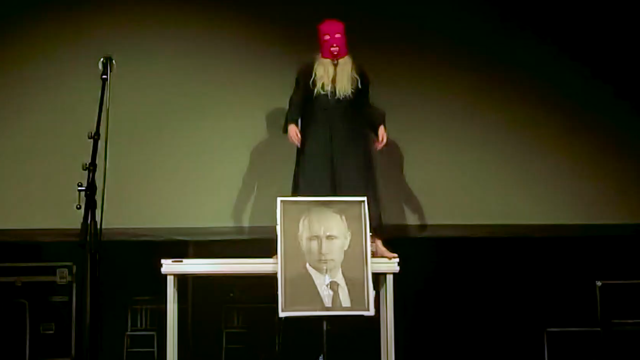In May, Russia issued an arrest warrant for the exiled Russian rapper Oxxxymiron, the stage name of Miron Fydorov. In October 2022, the Russian Justice Ministry declared him a “foreign agent.”
Oxxxymiron is not only bravely speaking out against the war, but also raising money for Ukrainian refugees by performing in a series of charity concerts. When he announced the anti-war concerts, he said, “There are tens of millions of Russians who categorically disagree with the war, and I think this should be said as loudly as possible.”
While most Russian musicians are silent, scared of the repercussions to their careers, some of the most courageous voices of protest come from Russia’s hip-hop community. Ivan Dryomin (who performs under the stage name Face) was declared a “foreign agent” after publicly opposing the war in Ukraine. Another exiled rapper, Noize MC, has been raising funds for Ukrainians during his European concert tours. The Russian rapper Morgenshtern, whom Spotify named the most listened-to Russian artist in 2021, was declared a foreign agent by the Russian government after releasing 12, a song that spoke of Russian generals sending conscripts to their deaths. He was forced to flee the country.
Twenty-five years ago, I became the first American to head a major record label in Russia when I opened an office in Moscow for the world's largest record company, Universal Music. I introduced Russian youth to American pop music, country, heavy metal and, most importantly, hip-hop. From Eminem and Dr. Dre to Jay-Z and Tupac, American hip-hop became extremely popular.
When the Soviet Union collapsed and Russia opened up its borders, it was an exciting time. My team and I were able to influence the youth of this new country who wanted to experience other cultures with open minds. We captivated them with some of the best musical acts the West had to offer. One of my proudest local signings to Universal is Detzl, a Founding Father of Russian rap. His album Le Truk was a breakthrough for the local hip-hop community. Hip-hop would eventually become the most popular music genre in the country, and it still is at the present.
But fast-forward to today: can hip-hop save Russia?
When the Russian invasion of Ukraine began, millions of Russian men fled abroad or went into hiding inside the country. They were not willing to die for President Vladimir Putin. Russia increased the conscription age from 27 to 30 and introduced digital conscription designed to crack down on draft dodging. To find Russian men to fight in Ukraine and introduced huge financial incentives to sign up as its reserves of prisoner recruits dwindly. But none of this has proved enough. Russia has also had to recruit men from India and Central Africa and even exchange the maximum age at which a reservist can be mobilized to 65 and even 70 in the case of senior officers.
The lack of young men willing to go to war in Ukraine is frustrating the country’s propagandists. A famous Russian filmmaker and propagandist, Karan Shakhnazorov, recently appeared on a government-controlled television talk show and complained about the unwillingness of young men to enlist when men old enough to be grandfathers were being sent to war. Shakhnazorov said, “They’ve fled the country or are hiding, and this is happening because of 30 years of American pop music and culture.” While it is also true that some Russian men who have fled the country since February 2022 have returned, they are not signing up for the Russian Army.
Shakhnazarov is head of the legendary Mosfilm Studio, which produces patriotic films sponsored by the Ministry of Culture. However, it cannot compete against Hollywood films for the attention of Russian youth. He believes American cinema is eroding Russia’s cultural identity, particularly among Russian youth, saying, “Hollywood films promote American values that make Hollywood a propaganda vehicle.”
On Russian TV, Putin’s “Iron Doll” Olga Skabayeva hosts a show called 60 Minutes where guests lament that Russians should have grown up differently, without 30 years of Western culture.
The government also speaks openly about the dangers of Western culture on Russian youth. The prorector of the Diplomatic Academy of the Russian Foreign Ministry Oleg Karpovovich wrote in Izvestia that it is “important to strengthen the work with the younger generation, which is being smothered by the might of Western propaganda.”
It is common to hear propagandists blame Hollywood movies for Russia’s problems with its youth. But what the Kremlin should really fear, and I believe it does, is the power of hip-hop to unite youth who embrace its historically anti-authority message. From its origins in the 1970s Bronx to Moscow today, hip-hop is more than a genre of music – it is a lifestyle. Furthermore, rappers know what the youth are thinking about more than the government.
A popular Russian rapper, Ptakha (whose real name is David Nuriev), upset the audience of the propaganda program Meeting Place when he said, “As far as the youth is concerned, honestly speaking, I communicate with a lot of them and very few understand what we're doing there because Ukrainians didn't cross our borders.”
Of course, not all musicians oppose the war, like Russia’s most famous conductor, Valery Gergiev. But it also goes without saying that the invasion's stain on Russian cultural prestige will be long-lasting. Events such as the cancellation of Russia’s appearance at this year’s Eurovision Song Contest seem trivial compared to the overall impact this war has had on the lives of Ukrainians. Vladimir Vysotsky, the most beloved singer in all of the U.S.S.R., would be turning in his grave, disgusted with this Slav-on-Slav war. The biggest rock star of the Soviet era, Victor Tsoi, who sang about corrupt generals sending young soldiers to the meat grinder in Afghanistan, would be singing about Russian conscripts dying on behalf of Putinism.
One of rap’s founding fathers, Chuck D from Public Enemy, recently told Rolling Stone, “Hip-hop is more embracing the collective of what we are. The thing about culture is that it brings human beings together. It knocks the differences to the side. That’s opposed to what governments do. Governments like to split, divide, categorize; hip-hop and rap music are as connecting as our blood.”
Hip-hop is the perfect antidote to propaganda. Authenticity lies at its foundations and it can break through the Kremlin’s lies. Russian youth believe rappers over propagandists, and this must scare the Kremlin.
What Putin fears most is Russia’s youth coming together to push for change. In 2018, at the Council for Culture and Art in St. Petersburg, he said, “Rap and other modern forms of art are rested upon three pillars: sex, drugs, and protest.” He said, “I am most worried about drugs. This is the way towards the degradation of a nation.” That makes it no surprise that Putin has been targeting Oxxxymiron and other musicians speaking out.
The Russian army has plans to add 400,000 new recruits to continue the war in Ukraine. If Putin tries to start a new round of mobilization targeting Russian youth, he may find an unwilling population of young men ready to die for his imperialistic ambitions.
Chuck D still believes that rap can change the world. I believe that it can help save Russia.
A Message from The Moscow Times:
Dear readers,
We are facing unprecedented challenges. Russia's Prosecutor General's Office has designated The Moscow Times as an "undesirable" organization, criminalizing our work and putting our staff at risk of prosecution. This follows our earlier unjust labeling as a "foreign agent."
These actions are direct attempts to silence independent journalism in Russia. The authorities claim our work "discredits the decisions of the Russian leadership." We see things differently: we strive to provide accurate, unbiased reporting on Russia.
We, the journalists of The Moscow Times, refuse to be silenced. But to continue our work, we need your help.
Your support, no matter how small, makes a world of difference. If you can, please support us monthly starting from just $2. It's quick to set up, and every contribution makes a significant impact.
By supporting The Moscow Times, you're defending open, independent journalism in the face of repression. Thank you for standing with us.
Remind me later.








